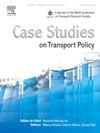Purchase process, travel behavior, and equity implications of e-bike rebates in Eugene, Oregon
IF 3.3
Q3 TRANSPORTATION
引用次数: 0
Abstract
Electric bicycles, or e-bikes, offer a transformative, equitable, and eco-friendly urban transportation solution. To encourage e-bike adoption, many organizations and governments provide incentive programs, such as rebates, to defray purchase costs. Despite the rise of these rebate programs, their impact on purchase decisions and travel behaviors remains largely unevaluated. This paper examines an e-bike rebate program administered in Eugene, Oregon, where the public utility began offering $300 e-bike rebates in April 2022. Specifically, we collected online survey responses from 324 rebate recipients and employed descriptive and mixed ordinal logistic regression analyses to investigate participants’ characteristics, the rebate’s role in the purchase process, and e-bike use. Most participants use e-bikes to replace car trips, signifying the potential of e-bikes to reduce auto dependence and advance mode shift and climate goals. The study also identifies how age, e-bike cost, and car ownership shaped participants’ perceptions of the rebate’s impact on purchase behaviors. People who are young, male, earn low incomes, previously owned non-electric bicycles, and hold graduate degrees ride their e-bikes more frequently than other rebate recipients. Yet results also show that e-bike rebate recipients are disproportionately male, White, higher-income, and hold graduate degrees, suggesting that the rebate’s benefits are not evenly distributed across demographic groups. These findings inform specific and actionable policy recommendations to address the identified equity gaps, such as implementing tiered, income-based, and point-of-sale rebates. Such changes can foster a more equitable integration of e-bikes into the sustainable urban mobility system.
购买过程、出行行为和俄勒冈州尤金市电动自行车回扣的公平性影响
电动自行车提供了一种变革性的、公平的、环保的城市交通解决方案。为了鼓励人们使用电动自行车,许多组织和政府提供了奖励计划,比如回扣,以支付购买成本。尽管这些折扣项目越来越多,但它们对购买决策和旅行行为的影响在很大程度上仍未得到评估。本文研究了俄勒冈州尤金市实施的一项电动自行车回扣计划,该计划于2022年4月开始提供300美元的电动自行车回扣。具体而言,我们收集了324名返利接受者的在线调查反馈,并采用描述性和混合有序逻辑回归分析来调查参与者的特征、返利在购买过程中的作用以及电动自行车的使用情况。大多数参与者使用电动自行车来代替汽车出行,这表明电动自行车在减少对汽车的依赖、推进模式转换和气候目标方面具有潜力。该研究还确定了年龄、电动自行车价格和汽车拥有量如何影响参与者对折扣对购买行为影响的看法。年轻、男性、低收入、以前拥有非电动自行车、拥有研究生学位的人比其他获得回扣的人更频繁地骑电动自行车。然而,调查结果还显示,电动自行车回扣的接受者不成比例地是男性、白人、高收入、拥有研究生学位,这表明回扣的好处并没有均匀地分布在不同的人口群体中。这些调查结果为解决已确定的公平差距提供了具体和可操作的政策建议,例如实施分层、基于收入的回扣和销售点回扣。这些变化可以促进电动自行车更公平地融入可持续的城市交通系统。
本文章由计算机程序翻译,如有差异,请以英文原文为准。
求助全文
约1分钟内获得全文
求助全文

 求助内容:
求助内容: 应助结果提醒方式:
应助结果提醒方式:


